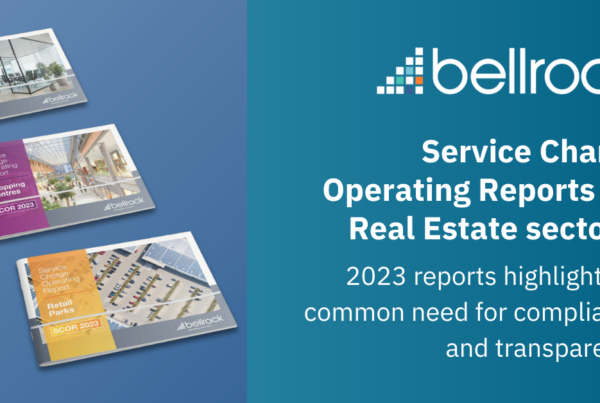A service charge is the cost incurred by a Landlord for the delivery or supply of common services in a tenanted or multi-tenanted building and/or estate which, through accounting transactions, is recovered from the tenants. The basis upon which this recovery takes place rises from the provisions set out in a lease between an occupier and their landlord.
On the 1st of April 2019, the RICS Professional Statement; Service Charges in Commercial Property, came into effect in respect of service charge years commencing on or after this date. After four editions of the document as a Code of Practice, the much-anticipated present iteration was considered a step in the right direction towards the more robust and transparent handling of service charges. The evidence of improved compliance with best practice in service charge management, monitored annually by Bellrock via the Service Charge Operating Reports (SCOR) publications, suggests that the Professional Statement has not had the desired effect.
Bellrock is the UK’s largest commercial service charge consultancy, specialising in the Office, Retail and Leisure sectors. As mentioned, Bellrock also produces the only annual cost benchmarking and RICS best practice compliance metrics in the UK market at present – the SCOR reports. As service charge experts, we are aware that service charges can be complex, complicated and, at times, confusing. This helpful Introduction to Service Charges gives a whistle-stop guide to what a commercial service charge is and what to be aware of.
A definition of a service charge has already been set out in the first paragraph. There is currently no legislation that applies to commercial property service charge – unlike its residential counterpart – and therefore the lease between a tenant and their landlord is the most important document, as it forms the legal basis upon which the landlord recovers the costs of providing and delivering the services from the tenant.
The lease will define the nature of the services to be supplied, but typically these will include hard services (such as maintenance, repair or replacement of the fabric and service installations, including plant), soft services (such as security and cleaning), utilities/energy and management. These services are essential for the effective running of the building, shopping centre or retail park and for the operational performance of the tenants occupying the space.
Service charge costs are rarely constant from year to year as they are influenced by inflationary factors, variances in service levels and irregular capital expenditures (capex). Capex is sometimes equalised through the collection of funds – reserve, sinking and/or depreciation – which avoids the peaks and troughs that can catch tenants off-guard who hold relatively short-term leases.
Why should a business care?
An efficiently managed building has a direct impact on the operational performance of a business and service charge cost levels represent a material part of total occupancy costs. These are controllable costs.
While reductions in service charge levels can be achieved, this should not be done at the expense of maintaining necessary service standards. It is important to ensure that the range of services delivered corresponds with those defined in tenants’ leases and furthermore meets their operational needs. However, there is often a misalignment between tenants’ requirements and those of landlords, particularly in mixed-use buildings and where leases are of variable lengths.
Compliance of the service charge costs with the provisions within a tenant’s lease is therefore paramount. Ensuring that service contracts are correctly interpreted and managed is similarly important. On behalf of tenants this can mean a reduction in their annual service charge liability and for landlords identifying these issues can mitigate the risk of challenge to irrecoverable costs in the future.
The apportionment of a service charge can be undertaken in different ways and while some leases are prescriptive others offer general guidelines on the practice. The RICS Professional Statement mentioned above provides useful guidance on apportionment but, again, the lease is the first and most important point of reference.
Whilst, as stated above, there is no over-riding legislation there is much established case law which will undoubtedly continue to evolve; this assists in guiding practitioners on matters of interpretation and application.
Service Charge Accounting
The accounting requirements in the Professional Statement have been made more robust and are supported by the ICAEW Technical Release – “Accountants’ Reports on Commercial Property Service Charge Accounts” – which recognises that accountants providing these reports will need to call upon other specialisms in order to be able to comment meaningfully on lease and service contract compliance. Again, as with the Professional Statement, it was hoped that the ICAEW guidance would bring about an improvement and increased consistency in terms of the scope and value of service charge year-end certification. The ICAEW Technical Release also sought to improve the use and reporting of accruals in service charge accounts. Accrual accounting is the most prevalent basis upon which service charge accounts are prepared. It is often the case, however, that many accruals are wrongly called such, and even when this is not the case, a control account for accruals is rarely set up in order to match them off as the relevant invoices are received and duly paid.
Incorrect accruals can result in occupiers paying for services in advance or, in circumstances of exercising a break option, lease surrender or expiry, paying for services which they do not benefit from.
Whether you are a tenant, landlord or managing agent, Bellrock can help ensure that your service charges are managed in the best way possible.
We will be releasing several articles over the coming months that deal with issues raised above, such as Apportionments, Funds and Major Works.
You may also be interested in: An Introduction to Service Charges – Am I paying the correct proportion of the service charge?







